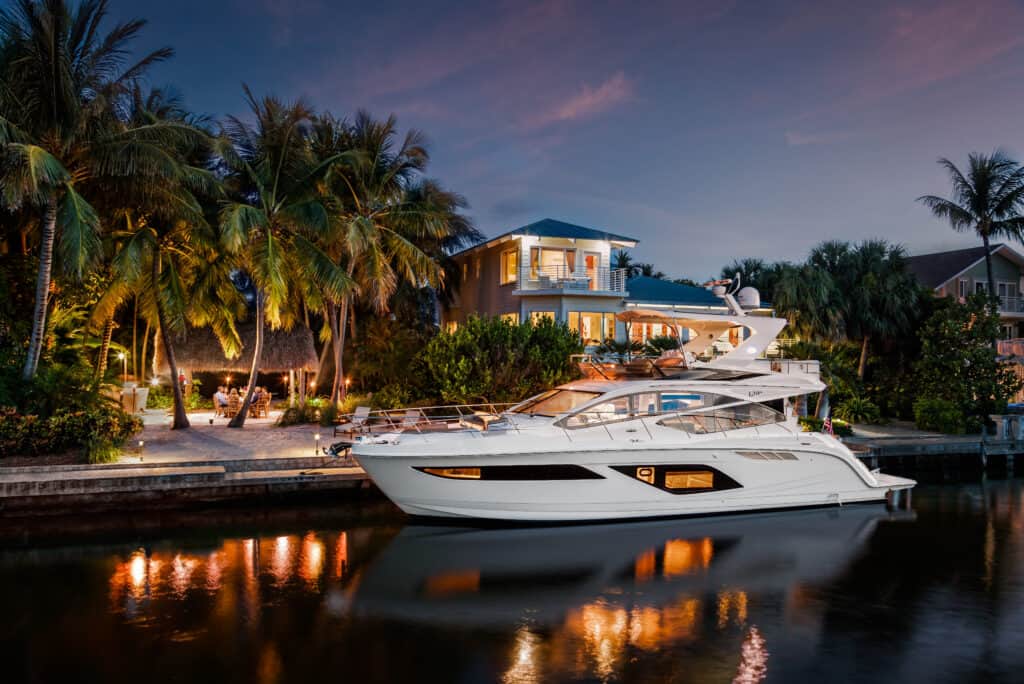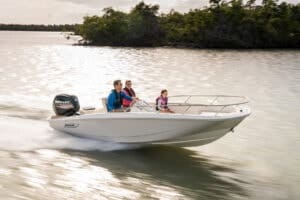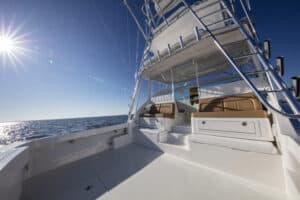According to recent data, there are more than 11 million registered recreational boats in the United States today, which includes everything from motorboats to sailboats and pontoons to yachts. If you’re thinking about joining this vast group of mariners, there are a few things you probably need to consider first.
Here’s a rundown of the 12 most important questions to ask when buying a boat, and how to ensure that you purchase the right boat for you and your family.
1. Should I buy a boat?
2. Why do I want a boat?
3. What kind of boat should I buy?
4. Where will I use my boat?
5. Where will I store my boat?
6. How much boat can I afford?
7. Should I get a boat loan?
8. What sort of boat loan should I get?
9. How do I get a boat loan?
10. Should I buy a new or used boat?
11. What to look for when buying a used boat?
12. How much will it cost to own a boat?
1. Should I buy a boat?
Sometimes, we need a reminder that there is a very big difference between needs and wants. Since boats most often fall into the latter category (though, there’s nothing wrong with that!), it’s important to consider how buying a boat fits into your financial goals and your family’s lifestyle before jumping into the purchase.
So, first thing’s first: should you buy a boat in the first place? Only you can answer this… but if the answer is yes, the next 11 questions will help you find the right one for you.
2. Why do I want a boat?
There’s no right or wrong answers here, but understanding why you want a boat can help you not only find the boat of your dreams but also ensure that the one you buy is the best fit for your life and budget.
- Do you want to spend the weekends out on the lake with your kids and family?
- Are you planning to take up water skiing or wakeboarding?
- Do your boat dreams include deep sea fishing or long oceanic journeys?
Asking questions about why you want a boat and how you plan to use it can help you hone in on your boat’s most important factors and simplify your search.
3. What kind of boat should I buy?
Now that you’ve had an honest talk with yourself about why you want a boat and how you plan to use it, it’s time to decide what type of boat fits the bill.
Consider factors like the boat’s
- Size
- Trailerability
- Seating capacity
- Propulsion type
- Number of hulls
- Speed, power, and performance
The trawler you’d want for long fishing trips in the Gulf of Mexico is probably different from the ski boat you’d want when teaching your kids to wake surf at the lake. If you’re envisioning a party boat for family and friends, a pontoon may be a better choice than a bass boat. And if you plan to stay overnight on your boat, you’ll probably need to choose a a cruiser with a cabin or even a liveaboard, rather than opting for a deck boat.
4. Where will I use my boat?
Will you trailer your boat to the lake on the weekends, keep it in saltwater, or go back and forth? How you plan to use your boat can affect you in terms of transportation, servicing requirements, storage, and even boat insurance.
5. Where will I store it?
In that same vein: where you will store your boat also affects your total boat cost and the type of boat you may want to buy.
So you plan to keep it in a slip all year long? Trailer it from your home to the water when you want to go out? Keep the boat on the water most of the year but then winterize and store it with a professional company?
Each of these can help you determine the size of boat that’s right for you, how much you can afford to spend, and whether you need to also consider purchasing a trailer.
6. How much boat can I afford?
Before you begin shopping around for your dream boat, it’s important to have an honest conversation with yourself about what you can actually afford to buy.
The cost of your boat is more than just the price on the sticker. You’ll need to factor in:
- The purchase price
- Sales tax
- Personal property taxes (depending on your location)
- Title fees
- Registration fees
- Insurance premiums
Each of these can add to the total out-the-door cost of your new boat.
If you don’t plan to pay for your boat upfront and in cash, you’ll need to calculate how much money you have available for a down payment. You’ll also need to consider what you’ll pay in interest for your boat loan, and how much your household budget will allow each month for a boat payment.
7. Should I get a boat loan?
Depending on the type of boat you’re considering, you could be facing a five- to seven-figure sales price (or more). If you aren’t ready to part with that kind of cash all at once, you’ll likely need a boat loan in order to finance your purchase.
With a boat loan, a lender (like Trident Funding) will front you the funds necessary to pay for your new boat, as long as you qualify for the loan. In exchange, you’ll repay that debt with interest over an agreed period of time, until the entire boat loan is satisfied.
In the meantime, your lender will serve as the lienholder for your boat, meaning that they will hold the boat’s title as collateral to secure your loan. If you were to default on (stop paying) your loan, the lender could repossess the boat to recoup the loss. However, if you pay as promised, the boat’s title will be released to you once the entire loan is repaid.
Unless you have the savings or other funding available — such as a home equity line of credit (HELOC) — to pay for your new boat in full, a boat loan will likely be necessary. Just know that in order to qualify, your lender will likely have requirements regarding your
- Income
- Boat purchase price
- Credit score
- Down payment amount
8. What sort of boat loan should I get?
Boat loans all serve the same general purpose: they are installment loans used to pay for, and are secured by, a specific asset — in this case, a boat — which are then repaid monthly for a predetermined period of time.
When shopping around for a boat loan, though, there are some factors you might be able to pick and choose for yourself.
For example, you may be offered a range of repayment terms, or how long you’ll have to repay the debt. The shorter the loan term, the higher your monthly payment will be but the faster you’ll be out of debt. A shorter loan term may also unlock lower interest rates, saving you money over the course of your loan period. A longer loan term, though, can give you a smaller monthly payment that might fit your household budget better.
While the amortization period will vary from one lender to the next (and may also depend on the boat you’re buying, your credit score, etc.), Trident Funding offers boat loans from seven to 20 years in length. To see how your monthly payment changes based on your boat loan term, be sure to check out our boat loan calculator.
9. How do I get a boat loan?
Before you begin applying for a boat loan, spend some time shopping around for the right lender.
Some lenders, like Trident Funding, will finance boat purchases as low as $25,000 or as high as $2,000,000. Other lenders may have different loan limits, so you’ll need to shop around for one that fits your boat purchase price.
You should also consider your credit history and FICO credit score. All lenders will run your credit in order to approve you for a boat loan; if you have a negative credit history or a lower credit score, you may not qualify or you might need to add a creditworthy co-borrower. At Trident, borrowers must have a minimum credit score of 680 or higher to qualify.
Once you’ve found the right lender, the actual process of getting a boat loan can be pretty simple. If the lender allows you to fill out an online boat loan application, it may only take you minutes to get approved!
Trident Funding, for example, will ask you questions like:
- How do you plan to use the boat? (leisure or liveaboard)
- Whether the boat loan is for a new boat, used boat, or boat loan refinance
- Some personal information: your name, birth date, address, email address, phone number, country of citizenship, and Social Security number
- Whether you have a boat picked out yet
- If so, details about the boat you want to finance: its year, make/model, engine, horsepower, fuel type, and whether or not it has a trailer
- How much you need to borrow: purchase price, sales tax, down payment, and loan term desired
The lender will run a hard inquiry on your credit at some point in the application process, and may require additional information about the boat before approving and disbursing the loan.
10. Should I buy a new or used boat?
One big decision in the boat-buying process is whether you want a brand new boat or if you’re alright with a used boat.
There are pros and cons to both sides. With new boats, for example, you’ll have the newest technology and features as well as a manufacturer’s warranty in place, in case anything goes wrong. New boats don’t have an unknown service history, either, so you never have to worry whether the previous owner took care of the boat or made shoddy repairs.
The trade-off, of course, is that used boats are often much cheaper than new boats, and don’t depreciate as quickly. You can often find a used boat with a warranty still in place, and may get lucky with a boat that was well-maintained and serviced.
Make a list of the factors that are most important to you (warranty, service history, features, price, etc.) to help you decide whether a used boat or new boat is the better fit.
11. What to look for when buying a used boat
If you decide to buy used, there are a few additional questions you’ll need to ask along the way. These will help you avoid unexpected surprises or added costs in the future.
Before buying a used boat, ensure that the seller answers the following:
- If it’s a used boat, why is it being sold?
- How many hours are on the boat? If the engine has been replaced, how many hours are on the new engine?
- Is there a warranty? If so, is it a manufacturer or third-party warranty, and how much is left? Does this warranty transfer?
- Do they have the boat’s service records?
- Where was the boat primarily used and where has the boat been stored?
- Can you take it for a sea trial (test drive)?
You may want to have the boat inspected by your own mechanic before buying, especially if a warranty isn’t included.
12. How much will it cost to own a boat?
The cost of boat ownership isn’t limited to your purchase price. In fact, that boat will continue to cost you money every single year, so it’s important to completely understand what you’re getting into before you buy.
Your exact boat expenses will depend on the specific boat you choose, but be sure to keep the following in mind:
- Annual registration renewal
- Annual insurance premiums
- Gas, oil, and other operating expenses
- Regular maintenance
- Replacement batteries
- Licensing (may vary by state)
- Repairs (fixing upholstery, replacing a prop, and everything in-between)
- Storage fees
- Seasonal services (winterization, etc.)
- Safety equipment and gear (life vests, first aid kits, ropes, flares, and more)
- Trailer maintenance (if applicable)
You can also check out our guide explaining the actual cost of boat ownership to learn more!
The Bottom Line: 12 Questions To Ask When Buying a Boat
The choice to buy a boat is no small decision, and can be costly even if you do everything right. Before you start shopping around for your next boat, be sure to ask yourself what sort of boat is right for you and your family, what you can afford, and how you plan to pay for that purchase. Being an informed buyer will help you pick not only the perfect boat for you and your bank account, but also help you find the right boat lender in the process.





